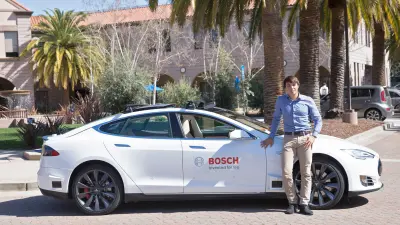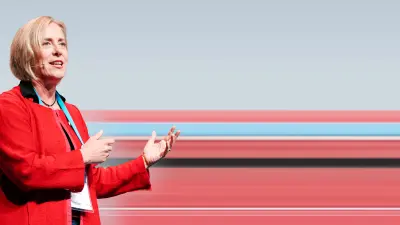Women and technology? More please!

Maria Belén Aranda Colás on the role of women in engineering professions.
Maria Belén Aranda Colás

Maria Belén Aranda Colás, who holds a degree in electrical engineering, works at Bosch as an advisor to the executive board. She is also active as a mentor and encourages young women to enter technical professions.
Mrs. Aranda Colás, in March you were honored as “Engineer Powerwoman 2017,” and can look back on an exciting career. How has the situation of women in technical professions changed?
I now have many more female colleagues in engineering professions. Bosch offers a wide variety of opportunities to take your professional development into your own hands and react with more flexibility to changing stages of life. Which is helpful, but is not enough. We need more female role models to inspire young women to enter technical degree programs. Tinkering around was fun to me even as a child, and I enjoyed math and physics. Today I develop technological innovations that improve many people’s quality of life. We need to more strongly foster young women’s existing interest in technology and show them what career opportunities are available.
What made your own path to a management position at Bosch easier?
I began my career in generator development and subsequently held positions in sales, marketing, and product management. Most recently, I worked as project manager with an international team on advancements to automated driving. In this context, I shaped a lot of our activities myself and contributed many of my own ideas. As a manager, I have benefited from the experience of other managers through different networks and mentoring programs. I found one project with managers from other companies to be particularly valuable, because it gave me a fresh perspective from the outside.


Loading the video requires your consent. If you agree by clicking on the Play icon, the video will load and data will be transmitted to Google as well as information will be accessed and stored by Google on your device. Google may be able to link these data or information with existing data.

Over the long run, innovation is impossible without diversity.
As a project manager for automated driving, you long shared responsibility for the many successes in this field. What role did the composition of the team play in this regard?
When we develop products, we focus on the needs of different people in different countries. The more perspectives we can incorporate into this process, the better the result. In my team, for example, a young woman from Ethiopia, an experienced engineer from France, and colleagues from Asia all worked together. This mixture led to us more quickly testing new ideas, and we all had a lot of mutual appreciation and respect for one another. Over the long run, innovation is impossible without di-versity. And this is another reason we need more female engineers.
How do you reconcile the needs of so many different associates?
As a company, you expect a certain level of flexibility from your associates, and so you should offer them a certain level of flexibility in return. In this regard, Bosch offers many different flexible working arrangements, like part time or job sharing. But we can also work flexible from any location. My teams included parents that regularly picked up their children from daycare or school in the afternoon, and then com-pleted any unfinished tasks later from home. My colleagues always rewarded flexi-bility and trust with motivation and excellent results.

What makes the balancing act between your career and private life easier?
This significant level of flexibility. If I want to work out before work, then my workday simply begins a little bit later. And I also like to take advantage of the ability to work from home. Here at Bosch, the results are what counts – not the amount of time you spend at the workplace. And the same applies to those in management positions.


